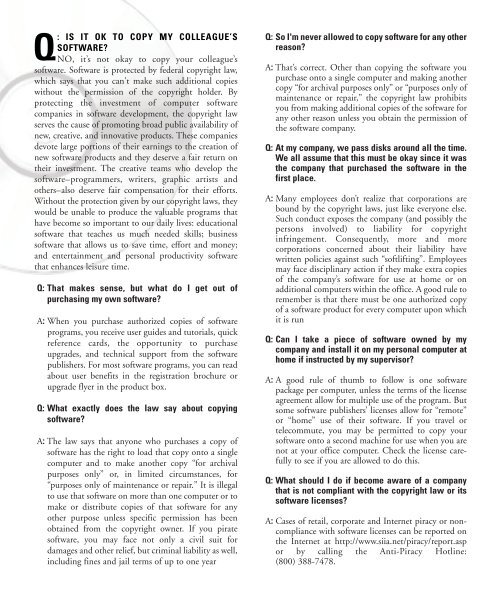Chem3D Users Manual - CambridgeSoft
Chem3D Users Manual - CambridgeSoft
Chem3D Users Manual - CambridgeSoft
Create successful ePaper yourself
Turn your PDF publications into a flip-book with our unique Google optimized e-Paper software.
Q: IS IT OK TO COPY MY COLLEAGUE’S<br />
SOFTWARE<br />
NO, it’s not okay to copy your colleague’s<br />
software. Software is protected by federal copyright law,<br />
which says that you can't make such additional copies<br />
without the permission of the copyright holder. By<br />
protecting the investment of computer software<br />
companies in software development, the copyright law<br />
serves the cause of promoting broad public availability of<br />
new, creative, and innovative products. These companies<br />
devote large portions of their earnings to the creation of<br />
new software products and they deserve a fair return on<br />
their investment. The creative teams who develop the<br />
software–programmers, writers, graphic artists and<br />
others–also deserve fair compensation for their efforts.<br />
Without the protection given by our copyright laws, they<br />
would be unable to produce the valuable programs that<br />
have become so important to our daily lives: educational<br />
software that teaches us much needed skills; business<br />
software that allows us to save time, effort and money;<br />
and entertainment and personal productivity software<br />
that enhances leisure time.<br />
Q: That makes sense, but what do I get out of<br />
purchasing my own software<br />
A: When you purchase authorized copies of software<br />
programs, you receive user guides and tutorials, quick<br />
reference cards, the opportunity to purchase<br />
upgrades, and technical support from the software<br />
publishers. For most software programs, you can read<br />
about user benefits in the registration brochure or<br />
upgrade flyer in the product box.<br />
Q: What exactly does the law say about copying<br />
software<br />
A: The law says that anyone who purchases a copy of<br />
software has the right to load that copy onto a single<br />
computer and to make another copy “for archival<br />
purposes only” or, in limited circumstances, for<br />
“purposes only of maintenance or repair.” It is illegal<br />
to use that software on more than one computer or to<br />
make or distribute copies of that software for any<br />
other purpose unless specific permission has been<br />
obtained from the copyright owner. If you pirate<br />
software, you may face not only a civil suit for<br />
damages and other relief, but criminal liability as well,<br />
including fines and jail terms of up to one year<br />
Q: So I'm never allowed to copy software for any other<br />
reason<br />
A: That’s correct. Other than copying the software you<br />
purchase onto a single computer and making another<br />
copy “for archival purposes only” or “purposes only of<br />
maintenance or repair,” the copyright law prohibits<br />
you from making additional copies of the software for<br />
any other reason unless you obtain the permission of<br />
the software company.<br />
Q: At my company, we pass disks around all the time.<br />
We all assume that this must be okay since it was<br />
the company that purchased the software in the<br />
first place.<br />
A: Many employees don’t realize that corporations are<br />
bound by the copyright laws, just like everyone else.<br />
Such conduct exposes the company (and possibly the<br />
persons involved) to liability for copyright<br />
infringement. Consequently, more and more<br />
corporations concerned about their liability have<br />
written policies against such “softlifting”. Employees<br />
may face disciplinary action if they make extra copies<br />
of the company’s software for use at home or on<br />
additional computers within the office. A good rule to<br />
remember is that there must be one authorized copy<br />
of a software product for every computer upon which<br />
it is run<br />
Q: Can I take a piece of software owned by my<br />
company and install it on my personal computer at<br />
home if instructed by my supervisor<br />
A: A good rule of thumb to follow is one software<br />
package per computer, unless the terms of the license<br />
agreement allow for multiple use of the program. But<br />
some software publishers’ licenses allow for “remote”<br />
or “home” use of their software. If you travel or<br />
telecommute, you may be permitted to copy your<br />
software onto a second machine for use when you are<br />
not at your office computer. Check the license carefully<br />
to see if you are allowed to do this.<br />
Q: What should I do if become aware of a company<br />
that is not compliant with the copyright law or its<br />
software licenses<br />
A: Cases of retail, corporate and Internet piracy or noncompliance<br />
with software licenses can be reported on<br />
the Internet at http://www.siia.net/piracy/report.asp<br />
or by calling the Anti-Piracy Hotline:<br />
(800) 388-7478.











